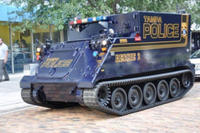-
Company develops telephone line “fingerprint” detector
Researchers at Pindrop, a new security company, have developed technology that can read telephone line “fingerprints” to prevent fraud and identify a caller
-
-
FBI increasingly concerned with “sovereign citizen” movement

Over the past decade, the FBI has grown increasingly concerned with the “sovereign citizen” movement; since 2000, sovereign citizens have killed six police officers and violent battles with law enforcement agents are on the rise; the U.S. National Counterterrorism Center classified the movement as a major threat alongside Islamic extremism
-
-
Taser rolls out redesigned wearable cameras

Last week Taser, the manufacturers of the electric stun guns, unveiled its newly remodeled wearable camera system which is sleeker and more advanced than its predecessor; the Axon Flex, introduced less than a year after the company rolled out its first wearable cameras, represents a significant upgrade
-
-
London holds massive Olympic security drill

Last week, in preparation for the London 2012 Olympic Games, more than 2,500 government officials, local police, and emergency responders participated in a two-day long emergency drill that simulated a terrorist attack on the city’s transportation network
-
-
Anthrax-decontamination foam used in meth lab cleanup
The meth cleanup problem in the United States is a big one; the U.S. Drug Enforcement Administration lists thousands of locations where law enforcement agencies have found chemicals or paraphernalia indicating the presence of either clandestine drug laboratories or dumpsites; Sandia’s decontamination foam, originally developed to deal with anthrax, is now also a meth eraser
-
-
Surveillance truck helps Fort Lauderdale keep streets safe
Police in Fort Lauderdale, Florida are trying a new approach to fighting crime – blatantly telling criminals they are under surveillance
-
-
In Keene, N.H., locals oppose military equipment for police
With the help of a $285,933 DHS grant, local police in Keene, New Hampshire were all set to purchase a new armored vehicle until local residents got wind of the plan; the citizens of the quiet New Hampshire town of 23,000, which has only seen two murders since 1999, questioned why police needed such an expensive military-type truck and balked at the militarization of a local force; with federal counterterrorism money continuing to pour into local communities, lawmakers and residents across the country will have to grapple with the same issues as Keene and determine what kind of police force they want to have patrolling the streets
-
-
Accenture develops crime management system for Norway
Accenture is developing a new national crime management system for the Norwegian National Police Directorate (POD) to support police investigations and criminal prosecutions in Norway; the crime management system will enable the Norwegian police force to manage, link, and analyze case information and intelligence for more reliability and consistency across law enforcement, police investigations, border management, emergency response, and case administration
-
-
Law enforcement supports N.Y. DNA database expansion
A growing number of New York law enforcement officials have backed Governor Andrew Cuomo’s proposal to expand the state’s DNA Databank
-
-
Major shipping companies inadvertently aid smugglers
A new study on sea trafficking reveals that the large majority of ships involved in the illegal transfer of weapons, drugs, and banned missile or WMD equipment are owned by major shipping companies in the United States, Germany, and Greece
-
-
Smithsonian balances security and openness – is it safe?

Following the 9/11 attacks security officials worried that the Smithsonian Institution with its millions of visitors and stores of valuable national treasures would be an ideal target for terrorists, yet the institution has done little to bolster security
-
-
Indianapolis emergency response center opens days before Super Bowl
With only a few days left until Super Bowl XLVI, which will be held in Indianapolis this year, security officials there unveiled a new emergency coordination center on Wednesday
-
-
Spike in violent incidents in hospitals

Over the past decade, hospitals across the nation have been subject to an alarming increase in violent incidents; in the last five years alone, there has been nearly a 300 percent increase in the number of reported homicides, assaults, and rapes compared to the previous five years
-
-
Police chiefs at White House to discuss domestic radicalization
Law enforcement officials from state and local agencies across the United States gathered on Wednesday at the White House to discuss the delicate balance between safeguarding against domestic extremism and maintaining the trust of the residents they serve
-
-
Tampa begins preparations for Republican National Convention

As Tampa Bay gears up for the Republican National Convention, city officials recently announced some of its security plans for the three day event scheduled to begin on 27 August; with roughly 2,000 law enforcement officers between Tampa and Hillsborough counties, a significant number of additional officers will have to be called in from surrounding counties
-
More headlines
The long view
Are We Ready for a ‘DeepSeek for Bioweapons’?
Anthropic’s Claude 4 is a warning sign: AI that can help build bioweapons is coming, and could be widely available soon. Steven Adler writes that we need to be prepared for the consequences: “like a freely downloadable ‘DeepSeek for bioweapons,’ available across the internet, loadable to the computer of any amateur scientist who wishes to cause mass harm. With Anthropic’s Claude Opus 4 having finally triggered this level of safety risk, the clock is now ticking.”
“The Federal Government Is Gone”: Under Trump, the Fight Against Extremist Violence Is Left Up to the States
As President Donald Trump guts the main federal office dedicated to preventing terrorism, states say they’re left to take the lead in spotlighting threats. Some state efforts are robust, others are fledgling, and yet other states are still formalizing strategies for addressing extremism. With the federal government largely retreating from focusing on extremist dangers, prevention advocates say the threat of violent extremism is likely to increase.
Luigi Mangione and the Making of a ‘Terrorist’
Discretion is crucial to the American tradition of criminal law, Jacob Ware and Ania Zolyniak write, noting that “lawmakers enact broader statutes to empower prosecutors to pursue justice while entrusting that they will stay within the confines of their authority and screen out the inevitable “absurd” cases that may arise.” Discretion is also vital to maintaining the legitimacy of the legal system. In the prosecution’s case against Luigi Mangione, they charge, “That discretion was abused.”
How DHS Laid the Groundwork for More Intelligence Abuse
I&A, the lead intelligence unit of the Department of Homeland Security (DHS) —long plagued by politicized targeting, permissive rules, and a toxic culture —has undergone a transformation over the last two years. Spencer Reynolds writes that this effort falls short. “Ultimately, Congress must rein in I&A,” he adds.
